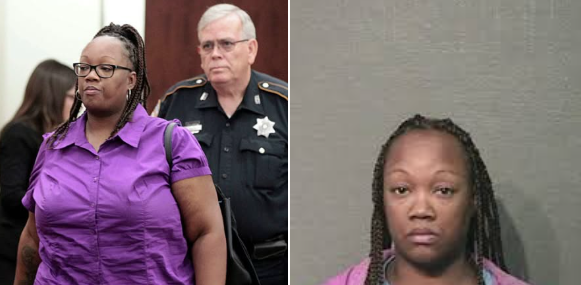Crenshanda Williams, a 43-year-old former 911 operator in Houston, Texas, is at the center of a disturbing case that has shaken the emergency services community. As an operator in one of the busiest emergency response centers in the United States, Williams was entrusted with the responsibility of handling life-or-death calls. However, instead of providing the critical assistance that thousands of callers needed, she repeatedly abandoned them—cutting off emergency calls and failing to provide aid when it was most crucial. The result was not just a breach of duty; it was a catastrophic failure that had lasting consequences.
Williams, who was employed at the Houston Emergency Center from October 2014 until 2016, was responsible for answering calls related to a variety of emergencies, from armed robberies to medical crises. But in an unimaginable breach of trust and responsibility, she repeatedly hung up on callers, leaving them without the help they so desperately needed. In some cases, the consequences were deadly.
The Startling Discovery of Crenshanda Williams’ Inaction
It wasn’t a one-time lapse in judgment. According to investigators, Williams’ actions were consistent and widespread, with hundreds of emergency calls abandoned during her shifts. She had the responsibility to assist those in distress, but instead of providing help, she hung up on them. During her tenure at the center, she was reportedly caught hanging up on calls from people who were trying to report emergencies like armed robberies, car accidents, and even medical crises.
In one instance, a caller was trying to report a robbery and mentioned hearing gunshots on the other end of the line. The caller, terrified and in need of immediate assistance, could only hear the gunshots before Crenshanda Williams cut the line and hung up. Tragically, that robbery led to someone being shot and killed. The failure to provide timely help could have been the critical factor that led to this tragic loss of life.
Investigators would later uncover that this was not an isolated event. Crenshanda Williams consistently hung up on calls, leaving residents of Houston to deal with their emergencies without the help of 911 operators.
The Callousness Behind the Negligence
When authorities began investigating Williams’ conduct, they were confronted with a chilling discovery. When questioned about her actions, Williams allegedly responded, saying, “I just didn’t want to talk to anyone.” For someone responsible for saving lives, this indifferent attitude was not only disturbing but completely unacceptable. Williams’ carelessness and negligence highlighted the severe lack of regard she had for the lives of others. She was tasked with responding to emergency calls—a job that demands empathy, swift thinking, and the ability to remain calm under pressure. Instead, her attitude was one of disregard, as demonstrated in another shocking exchange.
In another recorded conversation, Williams was heard saying, “Ain’t nobody got time for this. For real,” right before hanging up on another caller. This statement epitomized the casual dismissal of the duty she was entrusted with. The very essence of the 911 emergency system, a lifeline for those in distress, was undermined by her actions. Williams’ failure to assist people in their most vulnerable moments had devastating consequences, both for the victims of the emergencies and for the city of Houston as a whole.
The Unfolding Investigation
As more details of Williams’ actions came to light, it became clear that her misconduct was not a rare occurrence. According to the Houston Police Department and the Houston Emergency Center, over the course of her tenure, she hung up on nearly 200 emergency calls. Some of these calls involved situations where people’s lives were in immediate danger—ranging from medical emergencies to robberies and car accidents.
The Houston Emergency Center, which operates as one of the largest emergency response units in the U.S., came under intense scrutiny. Williams’ abandonment of calls was, in essence, a violation of the oath taken by every emergency operator: to serve and protect the public. During her investigation, Williams reportedly showed little remorse, which only fueled the outrage in the community.
Legal Consequences: A Short Sentence for a Grave Crime
In April 2024, after a prolonged investigation, Crenshanda Williams was sentenced to 10 days in jail and 18 months of probation for interfering with emergency calls. While this sentence may seem minor compared to the immense harm her actions caused, it was the result of a plea deal. Williams’ attorney cited personal struggles in her life, such as emotional distress and hardship, which allegedly contributed to her decision to abandon her duty. However, many feel that these reasons are no excuse for the lives that were lost or jeopardized due to her actions.
The case sparked widespread outrage and debate regarding the accountability of 911 operators and other emergency service workers. Many questioned whether the legal system’s handling of such a crucial case was enough to deter future negligence and to address the deep-rooted issues that led to such callous behavior. Victims’ families, as well as members of the public, voiced their concerns about the legal consequences not being severe enough for someone whose inaction directly contributed to people losing their lives or being put in harm’s way.
The Call for Reform in Emergency Services
The Crenshanda Williams case served as a wake-up call for reform within 911 dispatch services and emergency systems across the country. It raised essential questions about the vetting and accountability of emergency operators. People in positions of such critical importance must undergo thorough background checks, emotional assessments, and regular training to ensure they are fit to handle high-pressure situations.
Reform advocates have called for a system that includes greater supervision, more training, and tougher penalties for those who fail to perform their duties effectively. Calls for a more robust review of emergency response protocols have intensified, especially in light of Crenshanda Williams’ failure to respond properly to thousands of calls. There is growing support for enhancing the mental health support offered to emergency operators to help prevent future cases of negligence like Williams’.
The Impact on the Houston Community
The community of Houston, particularly the families affected by Williams’ negligence, has been left shaken by the series of events that led to her convictions. Several people who called 911 and were left stranded without help felt the impact of her actions deeply. While the legal system has addressed Williams’ misconduct, the emotional scars for many families remain.
For example, the family of the robbery victim who was shot and killed after being abandoned by the 911 operator has been vocal about their grief. They have called for stronger measures to be taken against negligent emergency operators and greater transparency in how such cases are handled.
Local advocacy groups have also raised awareness about the case, emphasizing the need for swift reform in emergency dispatch systems. These groups have used Williams’ case as an example of why emergency operator accountability is crucial and how systemic change is necessary to ensure public trust in emergency services is not further eroded.
The Ongoing Debate on Public Safety and Accountability
As the Crenshanda Williams case continues to be discussed in legal and social circles, it serves as a broader reminder of the importance of public safety and emergency services. It raises critical questions about the level of care and commitment expected from public service workers, especially those who are entrusted with saving lives.
In light of the mounting outcry, public safety agencies across the country are working on reforms aimed at improving both the efficiency and integrity of emergency response systems. Many have called for an overhaul of how 911 call centers operate, how operators are trained, and how emotional well-being is assessed during the hiring process.
Moving Forward: Justice for the Victims
As Houston continues to heal from the devastating impacts of this case, both the community and the families of those affected are seeking justice and reforms. Crenshanda Williams’ actions cannot be undone, but her case has prompted a broader conversation on the ethics, responsibilities, and accountability of 911 operators in every city and county.
For now, the victims’ families and the community continue to fight for justice, hoping that this case serves as a pivotal moment for change. As authorities continue to examine the full scope of her actions, the public remains vigilant, advocating for a justice system that recognizes the severity of negligence in life-or-death situations.
Conclusion: The case of Crenshanda Williams, the 911 operator who abandoned her post, continues to resonate deeply within the Houston community. As reform movements gain momentum and victims’ families demand answers, her story serves as a stark reminder of the immense responsibility that comes with serving as a first responder.


Leave a Reply